Lenses, as mentioned in part one of this series, are a specialized way of viewing your applications and documents. By default, there are two lenses already on the Unity launcher; they’re located near the bottom, just above the trash can. The first is for Applications, the other for Files & Folders. Clicking on one of them reveals that lens in the Dash.
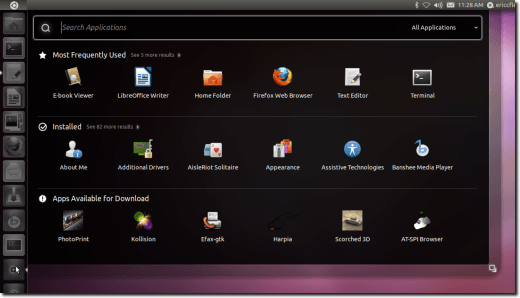
Here you can launch your favorite applications, browse through all of your installed programs, or view some random applications available for installation.
Note: just as more Quicklists are being developed, so too are new lenses being created, all in an effort to make Ubuntu more useful and user-friendly.
If you right-click the Files And Folders Lens in the launch bar, however, you’ll see this menu.
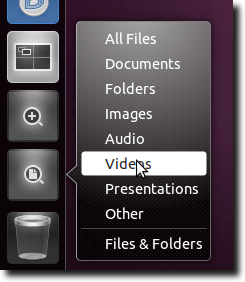
This Quicklist allows you to easily refine the type of document (or application, had you right-clicked on the Applications lens), and view just what you want. Here we’re using the Files & Folders lens to show us only the images on our system.
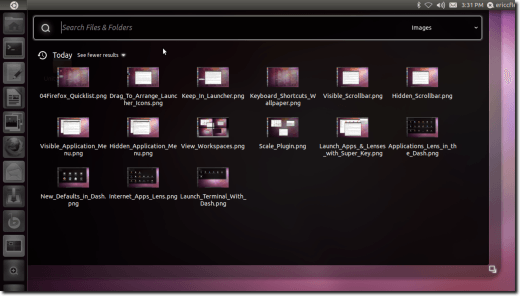
What you can’t know from the above screenshot is that we aren’t simply browsing our Pictures folder. In fact, at the moment there aren’t any images in our Pictures folder. The images shown are the result of a quick search, and will show us documents that match the filter (in this case images), no matter where they’re located.
Other Unity/Compiz Features
If you want to use the new Unity interface with just your mouse, you can. But with some keyboard shortcuts (some new to Unity, while others have long been options as Compiz plugins), you get a whole new level of ease of use.For instance, hit the Super key (the Windows key on most keyboards), and the Dash appears. This is nice on laptops, because now you can keep your fingers on the keyboard; you don’t have to “mouse” up to the top left corner of the screen just to trigger the Dash.
If you hold down the Super key, you’ll see little numbers and letters appear over every entry in the launcher. Click that key combination (Super+number/letter), to easily launch that application or lens.

It can be hard to manage a large number of open windows, but if you hit Super+W you’ll see them all aligned in a grid. Click whichever you want to go to it, or hit the Escape key to return to what you were doing before.
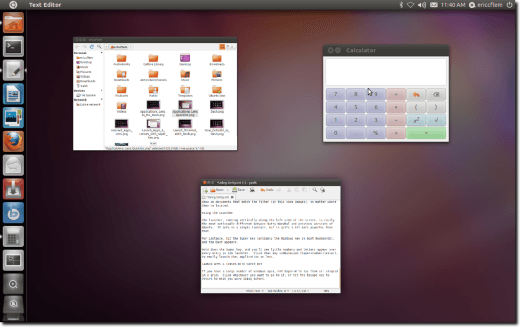
Note: this is actually the Compiz Scale plugin. In reality, Unity is a Compiz plugin as well, and can be completely disabled to use Ubuntu with its traditional setup.
To see all of your current workspaces and move windows between them (another Compiz plugin), hit the Super+S key combination.
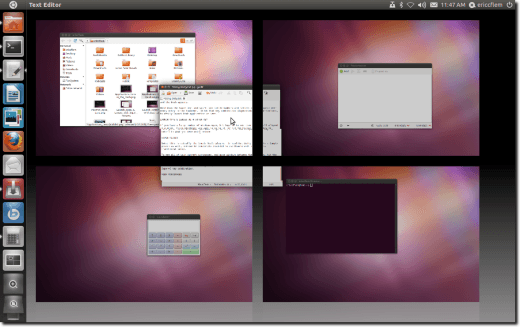
There are a ton of different keyboard shortcuts available. A user named Octavian Damiean, posting on askuubuntu.com, created a wallpaper – based on the Natty Narwhal default image – that shows all default keyboard shortcuts. It looks like this in use, and is very handy (especially at first), for remembering exactly what all the different shorcuts do! You can download the wallpaper in this thread.
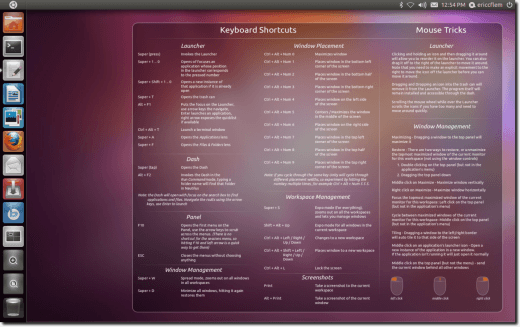
As you can see, there’s a lot you can do without ever taking your hands off the keyboard!
Where are the Scrollbars and Application Menus?
Another new interface element (at least as far as being the default, as pertains to the global menu), is that the menu bar for an application is now in the top panel, instead of attached to each window. It’s hidden by fault, so that all you’ll see is the name of the application you’re running, like this:
However, simply mouse over the menu bar (at any point between the name of the application and the beginning of the Indicator applets and the menu will appear.

One other thing that’s been hidden in each window is the scroll bar handle. In an effort to regain as much screen real estate as possible, this is all you’ll see in a window.
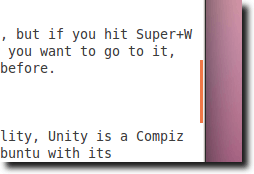
However, place the mouse anywhere over the little orange strip, and a handle overlay appears. Grab this to navigate up or down through your window.
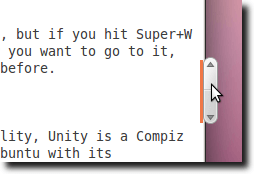
Both these new features are a great way Unity saves space, while still being very stylish.
Note: the global menu applet was previously available in older versions of Ubuntu, but was never turned on by default. Also, not all applications have perfect support for these new tweaks. Firefox, for example, uses the global menu, but not the scroll bar effect, while LibreOffice uses neither.
And that’s it for now. Those certainly aren’t all the new features Natty Narwhal has to offer, but they are among the most visible. Hopefully this little run-through of what Natty has to offer, where you can find it, and how you can be a bit more efficient, has been useful. As time passes, of course, more and more tweaks and productivity enhancers are sure to make their way to Natty, and we’ll be sure to bring them to you.

No comments:
Post a Comment